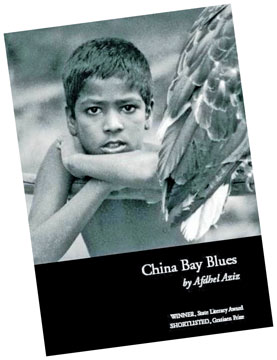In between tenderness and truth
By Rushda RAFEEK
Knotted along with a fusion of sharp photographs, I pull Afdhel
Aziz’s book of poems elegantly like drawing a haansi putuwa towards an
embrace of an old friend and wait for my Kusuma to bring our tea. I take
a look at the back of his book more closely while a Bohemian afternoon
softly scintillates. It holds tight the prestige as a winner of the
State Literary Award and as a shortlist for the Gratiaen Prize 2003.
 It is two years now considering the time this book was shoved into
the bookshelf after having read it for the first time. Some books do
that however slim they are. They acquire the ability to reunite with
your hands, clear away distance and re-scribble into your heart. China
Bay Blues without a mirage of doubt is one of them. At least one of the
few Lankan themed. It is two years now considering the time this book was shoved into
the bookshelf after having read it for the first time. Some books do
that however slim they are. They acquire the ability to reunite with
your hands, clear away distance and re-scribble into your heart. China
Bay Blues without a mirage of doubt is one of them. At least one of the
few Lankan themed.
And so as we speak, under the conflicting harmony of birds my
attention shifts to the poetic crescendo adorning the milieu. I re-read
Patriot laden with cannonballs of questions shot with concern.
“So will you die for your country?” It asks sitting on a white glossy
page against a carved Buddha in meditation peppered with young school
lads under his lotus pose marking the acme of a true patriot relevantly.
“Love is sacrifice
but which comes first
which comes fierce
my country or me?”
Survival issue
It is staggeringly astringent. Like a thwack of sour lime the poem
ends raising the survival issue of a patriot. In an effort to how one
can be judged. A decision of a citizen living or a soldier dying makes
one love his/her country far more is but, an audacious leap of the
latter. As we tread from the lines of Meditation in Chelsea we linger at
1983 which incurs the reflections of terrorism, “the echo of the late
train” and “a Muslim moon” volunteers to mourn the egg of uncertainty
that was once hatched.
The malignant call for ethnic ‘freedom’ did not, but dive into “the
dry burning streets” inspiring a Sinhala neighbour to save his Tamil
friend from mobs and fires that charred the innocence of July. A pottu
smeared off hurriedly from a young woman’s forehead so she could escape
her identity from the teeth of death suddenly colours one’s mind in
distress. How pronounced the poem is, to want the reader shape more
deeper narration. I relish.
I do not, though it is better, want to disturb when Neruda dreams, so
we snatch the whiff of cinnamon breathed into the poem and make a
beeline to Untitled (carefree and sun burnt), which is a drive back from
Galle to Colombo “when we slowed to a crush of vehicles.”
|

China Bay Blues by Afdhel Aziz |
The ‘we’ possessed in this poem could be an array of family members
or two birds in love wafting past a daydream of a holiday well spent
however stuck in the wax of an accident spilt in the middle of the road.
We notice broken glass, khaki policeman, a usual crowd seduced by the
shocking calamity and “a pair of shoes with no feet in them/ like a
fossil found in old limestone”. Afdhel certainly has employed a curtain
of words drawing in the lines between the bloody tuft of death and loss
when considering even the beauty that crests the end:
“when a woman with flour in her hands
picks up a phone
that has just begun to ring”
My heart
My heart stands many coloured. It also quivers having hit by soft
arrows of poetry. Positively lost, I hear 'Miles Away' accompanied by a
composed photograph of a Jazz player hitting a very intense note into
the brass of the instrument as it looks to me. It harmonizes with the
poem just as exactly.
“pursed lips, brow furrowed
in concentration, as
cheeks puff in prayer.”
On the face of it, I wonder if only I could have Afdhel inside a
jukebox singing in pale drone instead of these creaks in the swinging
shadows. In a way this is poetically Mozart. Dripping with ablution
appears After Kothuba, which is something of a tea time favourite, which
could be grasped with a few Munchies and nostalgic laughter perhaps. It
maybe lunchtime in the setting of the poem where the poet sits with his
aunt recalling the days:
“how my grandmother
used to smoke Three Roses
cigarettes, lurking in the verandah
while her husband snoozed inside”
I fancy how it is tinged with a family memory now running towards the
young and learning generation. Who wouldn’t want to miss out the clever
lady strategies your grandmother once put on? Although you still want
that polka dotted pencil skirt of hers sloshed down into a hidden
almirah. There is just a kind of benediction of these Friday afternoons
to relive the gone which is more than a memory to revitalize on a holy
day which may seem the princess of the genuine interest developed by the
poet as he thrives deeper into his family tree. It religiously is a
celebrative little poem. I simply cannot say enough in praise of this
poet.
We come to the second section of poetry stacked under the title
‘Secret Gardens’. Just as expected, “there is someone who will spin you,
until you’re dizzy, then kiss you until you’re giddy...” in Full Moon
Fox. This poem is rather apt to a fresher setting indirectly announcing
your arrival to all things which will now seduce, enchant and tease like
Healing hands, Safecracker and Breath. Desire is just too hot to touch,
like some steamy light bulb- it illuminates maintaining the fierce and
magnetic within a cool yellow of tone. Smeared with bee sting and
“velvet darkness”, it leads one to salivate. Very bridal and slow, walks
seduction in each aisle of spaced first lines and then, Afdhel adds a
startling twist of speed you wonder whether this, is a sign of passion’s
best. To me, it casts a jibe handsomely. Raw and stubbly, this poem has
a chance to wring down a pool of clothing.
I dust my feet off the evocative sometimes ethereal Quartets for
Colombo, Galle and Nuwara Eliya which ticks in sync skillfully
constructed and close my eyes in devotion to the strands of Lighthouse
time which rushes upon me as the birth of a wave on a deserted shore. It
drips like melon juice that which your arm can’t hold anymore of its
precious lull. With “visiting angels”, “temple bells” and “a tropical
kiss”, “a sweep of light that arc/ pure and true” is hymnal as lullaby
to sleep under.
Often but certainly, we breathe in the air pinched with gripping
stops, heartbeats, lust’s filling, Jazz groans and Diaspora’s bridled
delights adding the seal of love for what has been left behind in order
to embroider notes of delicate skill coalescing with surreal imagery in
its thickest verity. The House on the corner is a generous slice of
perfection what could be offered to a Sri Lankan far away fevering for
home. Shifting to a very narrative prose of sorts dipped in reasonable
respect we quickly learn the poet is hitting that dim fade of his
defunct prime-time spent in the house on the corner equating as the main
decorous. Afdhel revisits:
“Before I existed, before I was even imagined,
it was there in its own private parts of the universe.”
You can trust every word as you follow the poem’s tracings “of an old
black car, cake shaped like 'Mickey Mouse' and where the rain leaks
through the ceiling- buckets and basin...” which redeem the real bite of
a delightful reminder. “Huck Finn, Chopin, the muezzin, the
‘bothal-patherey’ man, a Sinhala neighbor confronting an angry mob”, in
a higher concept, leave an impassable impression. And by that, as Afdhel
would tell us, has “seen the good and bad from this house.”
Interest
The other story is rather longer in length and descriptive by serious
interest. Happiness collects a string of events in pure detail played by
a youth smeared in front of a washroom mirror beginning a day’s
beginning. The flow serves undeniably a clever tactic by adding a lot of
cream to abstain from ripples. Imagery informs like a sketch through
mood and the blowing of erratic atmosphere. How fitting, is the end, as
it comes like a pinch that which is deathly when the youth learns the
sudden demise of his neighbour and how.
“He feels his lungs hardening, air rushing into them like a wind in
mountain caves.” The cloak of grief that drapes around his embodiment
completely takes power serving that life on a whole, comes with loss
however much ‘cream’ is added.
Tucking all fifty poems and two short stories together in sections
that have conceived titles of their own; ‘Noon Shadows’ and ‘Secret
Gardens’ helps to prove the subject of accent is cogent, well structured
and honeyed impinging on sensuality flesh and full. This, by given
thought, makes you want to sit and discover again. It is shameful if I
leave out the photographs by Shehani Fernando without hanging some
praise to them as well.
Quality
Each picture resides under sheer quality perfectly capturing
landscapes of fluid confessional beauty supported by lotus ponds,
sculptures, silhouettes, boats and oceans.
Kusuma never arrives, but by this time, those tired beaks have
pricked the sky causing it to bleed in vivid streaks of lavender which
will eventually fall into a hole dark as night. I find the lid of this
book closing. What do I do? Mouth creaked open in a yawn, everything has
its end attached to its beginning, I console to self. I sniff the book
long and true like every book lover and make my way to the bookshelf. I
replace it back, gently this time. That’s the thing with books. You very
well know when you will hear its next call, creased but always
preserved. |

